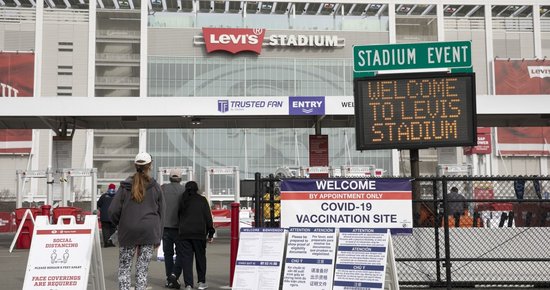
Patients enter Levi’s Stadium to receive the Pfizer COVID-19 vaccines on February 9, 2021 in Santa Clara. Anne Wernikoff photo, CalMatters.
###
Californians with high-risk medical conditions will qualify for the COVID-19 vaccines starting March 15, the state health secretary announced today.
According to previous state guidelines, people with chronic conditions did not qualify for vaccination until people aged 65 and over, first responders, food industry workers and educators were vaccinated. This totaled nearly 15 million Californians who qualified before those with chronic and serious illnesses could apply.
Under the new guidelines, people aged 16 to 64 with high-risk conditions – such as heart, lung or kidney disease, diabetes, cancer and weakened immune systems – or with developmental disabilities will join older, hard-working Californians from the food sector and educators as of March 15.
Dr. Mark Ghaly, California’s secretary of health and human services, said at a news conference today that putting off for a month will allow the state to increase its vaccine supply, develop ways to determine eligibility and find out how to reach people who are at home.
Defenders of the disabled and people with serious medical problems criticized Governor Gavin Newsom for not prioritizing some of California’s most vulnerable residents, saying he was sacrificing equity in exchange for speed.
30% of patients with BMT die within 30 days of the diagnosis of COVID-19. This is not enough to prioritize us for vaccination. It is so hard to live in a world that treats us like disposables #HighRiskCA https://t.co/xlWSTcIQ9s
– Brooke Vittimberga (@brookevitti) February 12, 2021
Until last month, California included people with disabilities or chronic medical conditions in the same priority group as Californians aged 65 to 74. They were listed in the category just behind people aged 75 and over. But the state has changed to prioritize vaccinations mainly by age, targeting those 65 and older. This meant that clinically vulnerable people were left behind.
State officials have listed serious health conditions in a notice to providers, including:
- Cancer, current with weakened or immunocompromised status
- Chronic kidney disease, stage 4 or higher
- Oxygen-dependent chronic lung disease
- Down’s syndrome
- Immunocompromised state (weakened immune system) of solid organ transplant
- Pregnancy
- Sickle cell anemia
- Heart problems, such as heart failure, coronary artery disease or cardiomyopathies (excludes hypertension)
- Severe obesity (body mass index ≥ 40 kg / m2)
- Type 2 diabetes mellitus with hemoglobin A1c level greater than 7.5%
The Federal Centers for Disease Control recommend that people with underlying diseases, including heart and kidney disease, diabetes, cancer, weakened immune systems, Down syndrome and obesity, receive the vaccine along with those aged 65-74. But states can adjust these priorities.
Other states vary in how they prioritize people with health problems.
New York will begin vaccinating people with high-risk illnesses, including pregnancy and developmental disabilities, on Monday. Florida currently vaccinates people considered by hospital providers to be “extremely vulnerable” to COVID-19, along with people aged 65 and over. In contrast, Kansas placed people under the age of 65 in high-risk conditions behind people aged 65 and over, prisoners and those living in “congregated settings” that are not nursing homes.
###
The coverage, translation and distribution of CalMatters COVID-19 are supported by generous donations from the Blue Shield of California Foundation, the California Wellness Foundation and the California Health Care Foundation.
CALmatters.org is a non-profit, non-partisan media venture that explains California’s policies and policies.
